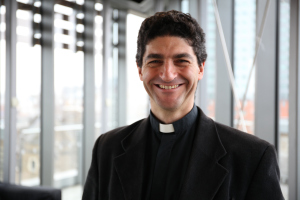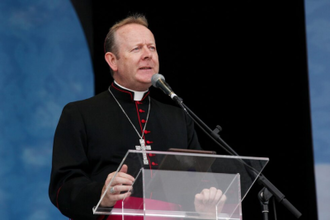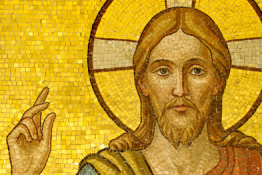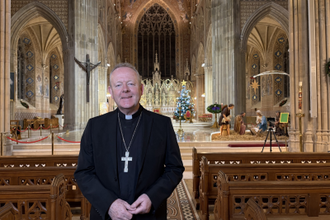Fr Augusto Zampini reflects on the meaning of kingship

Fr Augusto Zampini-Davies
Fr Augusto Zampini-Davies gave the following homily on Sunday, the Feast of Christ the King, at Holy Apostles, Pimlico, central London.
This week a bishop showed me a letter where a faithful Catholic was complaining about something happening in his diocese. The letter ended with a motto: 'long live Christ our King'. But given the tone of the letter, I doubt this person in particular (and we Catholics in general) actually understand what does it mean that Christ is a king.
A King or a Queen is somebody who has power to rule over a certain kingdom, territory and people. Today, these rulers are not necessarily Kings or Queens, but also presidents or prime ministers, sometimes elected by people. Arguably the most powerful neo-King on the planet is Mr Donald Trump, recently elected president of the United States, voted by many white Catholics of that country. Trump epitomises what a modern king is all about: power, wealth and popularity. But is this the sort of feast we are celebrating today? Is this the way Christ reigns?
Jesus' kingdom is a total reversal of the roles usually assigned to royalty. Instead of being served, he is a King who serves the other. Rather than being a wealthy King with a comfort life, he was born poor, worked in a simple job, and died as a beggar and a criminal. Instead of having media advisors on how to increase his popularity, he was continuously asking his disciples not to tell anybody the marvellous things (miracles) he was able to do. Rather than telling his supporters anything they wanted to hear, Jesus used to challenge them, inviting them to live the values of his kingdom, values that he himself live. But what are these values?
Regarding power, Christ's kingdom is not about increasing domination over others, making alliances with other powerful people, and expelling from the kingdom those who are powerless, like the migrants. On the contrary, serving everyone, especially the powerless, manifests Christ's power. For example, rather than preventing the disadvantaged of society people from having access to healthcare, Jesus used to heal and cure all those who were sick; and did it gratuitously.
In terms of wealth, Christ's kingdom is not about increasing the power of money, but the power of mercy. His wealth is not represented by a tower where just a few already wealthy people can enter and visit; but by a cross with which everyone who can feel identified with, particularly those who suffer from injustices.
Money, as the Holy Fathers of the Church and Pope Francis say, is "the devil's dung". Money could be the source of all evil if it does not serve. Indeed, money is just a technical instrument of mediation, useful to compare values and rights, to save and to fulfil obligations. But as any technical instrument, it is not neutral or value-free. It acquires value according to the means and circumstances for which it is used. When we affirm the neutrality of money, we are already falling into its power. Enterprises and businesses do not exist merely to gain money, as we hear every day in the media or at work. Their main purpose is (or should be) to serve, and of course to have a reward for that. That's why it is urgent to recover the social meaning of business and financial activities, using the intelligence and creativity of entrepreneurs.
To counter a misleading understanding and practice of wealth, Christ's kingdom proposes the power of mercy. This weekend we are concluding the year of mercy, which is not just about reconciliation with friends and parents, but also with the harm I cause by the use of my money or wealth to poor brothers and sisters and to Mother Earth. God's name is mercy, and Jesus' practices reflect this. Mercy is the overarching principle of Jesus' life-mission. He is moved by compassion when he sees people suffering. Christ the King is here to heal, save and liberate, not to harm, condemn and oppress. Likewise, the Church exists to heal, save and liberate. Mercy is therefore the ethos and pathos of the Church, its criterion of authenticity. We, as living stones of the Church, are going to be judged according to the mercy we have had during our lives. When we are moved by compassion due to the suffering of people and of the earth, we are following Christ, the King of mercy.
A third characteristic of Christ's kingdom is also related to popularity. Mercy is not merely about acts of mercy, which are good and necessary. Mercy, in God's kingdom, goes deeper. Reacting to the suffering is one side of the coin. The other is tackling the causes of suffering. When we deploy acts of mercy (e.g. visiting an elderly person in a nursing home, or giving money or food to a beggar, or planting a tree) everybody applauds. But when we start questioning the roots of poverty or ecological degradation (e.g. why are so many people begging for food in England, a rich country; or why are so many natural forests destroyed worldwide), then some people react differently, either with indifference or with rejection. Jesus was not crucified because he was doing good and healing people. He was crucified because he was questioning the reasons that caused people's suffering, sometimes those reasons being religious ones (e.g. healing on a Sabbath, an putting every person before this religious institution). This is not popular. In fact, before dying Jesus was scorned and mocked not only by the religious, political and military authorities, but also by other vulgar convicted people.
Dying on his cross-throne, Jesus is thrice taunted for the fact that he does not save himself. "You a saviour?" they jeer. "Then save yourself." His reign subverts our notion of kingship. He is not here to reign and save himself, but to serve with mercy and include others in his kingdom (save them). Let Christ the King grant us the power of mercy so as to serve others -especially with those who suffer the most, and not just to serve our own interests. I hope that when we say 'long live Christ the King', we can have this in mind.


















